

Donna Henty
ADEC Marine ease the burden of knowing what is the correct marine safety supplies to purchase as our expertise and knowledge will keep you in safe hands. For more details contact us:
Why and when do I need to service my lifejackets. When you are out on the water you probably wouldn’t dream (we hope) of being without a life jacket, just in case the worst happens.
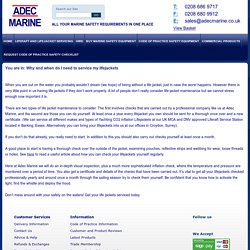
However there is very little point in us having life jackets if they don’t work properly. A lot of people don’t really consider life-jacket maintenance but we cannot stress enough now important it is. There are two types of life jacket maintenance to consider. The first involves checks that are carried out by a professional company like us at Adec Marine, and the second are those you can do yourself. At least once a year every lifejacket you own should be sent for a thorough once over and a new certificate.
If you don’t do that already, you really need to start. A good place to start is having a thorough check over the outside of the jacket, examining pouches, reflective strips and webbing for wear, loose threads or holes. Don’t mess around with your safety on the waters! Things to consider when naming your boat. Seeing as you’re visiting our website, our guess is that there’s a good chance that you have, or are planning on buying, your own boat.
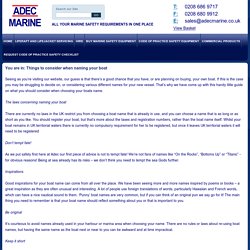
If this is the case you may be struggling to decide on, or considering various different names for your new vessel. That’s why we have come up with this handy little guide on what you should consider when choosing your boats name. The laws concerning naming your boat There are currently no laws in the UK restrict you from choosing a boat name that is already in use, and you can choose a name that is as long or as short as you like. You should register your boat, but that’s more about the taxes and registration numbers, rather than the boat name itself.
Don’t tempt fate! As we put safety first here at Adec our first piece of advice is not to tempt fate! Inspirations Good inspirations for your boat name can come from all over the place. Distress Flares Explained. Distress flares are an essential piece of equipment for any boat.
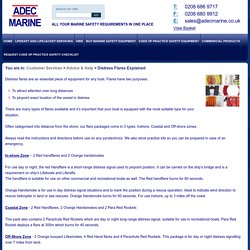
Flares have two purposes: To attract attention over long distances To pinpoint exact location of the vessel in distress There are many types of flares available and it’s important that your boat is equipped with the most suitable type for your situation. Often categorised into distance from the shore, our flare packages come in 3 types: Inshore, Coastal and Off-shore zones. Always read the instructions and directions before use on any pyrotechnics. In-shore Zone – 2 Red handflares and 2 Orange handsmokes For use day or night, the red Handflare is a short-range distress signal used to pinpoint position. Orange Handsmoke is for use in day distress signal situations and to mark the position during a rescue operation. Coastal Zone - 2 Red Handflares, 2 Orange Handsmokes and 2 Para Red Rockets This pack also contains 2 Parachute Red Rockets which are day or night long-range distress signal, suitable for use in recreational boats. EPIRB alerts - how do they work. What do you use an Emergency Position Indicating Radio Beacon (EPRIB) for?
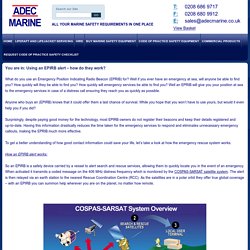
Well if you ever have an emergency at sea, will anyone be able to find you? How quickly will they be able to find you? How quickly will emergency services be able to find you? Well an EPRIB will give you your position at sea to the emergency services in case of a distress call ensuring they reach you as quickly as possible. Anyone who buys an (EPIRB) knows that it could offer them a last chance of survival. Are inflatable boats safe on the ocean. This is a question we often get asked as people are concerned about the safety of inflatable boats, largely because they can puncture on sharp items.
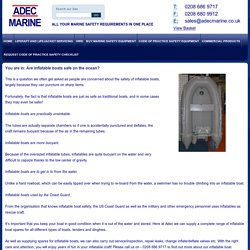
Fortunately, the fact is that inflatable boats are just as safe as traditional boats, and in some cases they may even be safer! Inflatable boats are practically unsinkable. The tubes are actually separate chambers so if one is accidentally punctured and deflates, the craft remains buoyant because of the air in the remaining tubes. Inflatable boats are more buoyant. Because of the oversized inflatable tubes, inflatables are quite buoyant on the water and very difficult to capsize thanks to the low center of gravity.
Inflatable boats are to get in to from the water. Unlike a hard rowboat, which can be easily tipped over when trying to re-board from the water, a swimmer has no trouble climbing into an inflatable boat. Inflatable boats used by the Coast Guard. ACR EPIRBS, PLB and VHF Radios - Marine Electronics. Liferaft Servicing - Yachting Leisure Liferafts - Adec Marine. Life raft Hire, Life jacket Hire, EPIRB hire, Immersion Suit Hire. VHF Marine Radio and Navtex - Adec Marine. Pyrotechnics - Distress Flares - Adec Marine. Category C First Aid Kit from £57.60 - Adec Marine. Lifejackets. Lifebuoys and Accessories, Drogues and Horseshoe Lifebuoys. Marine Safety supplies and Marine Safety Equipment.